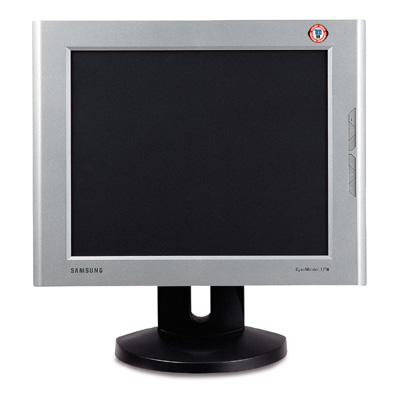Some not-so-obvious
advantages
LCD panels are lightweight
and require much less space on the desktop than traditional CRTs – this much
we know. They also consume less than half as much electricity, which in an
office with more than a couple of monitors can add up to a significant savings.
They don’t give off as much radiation or heat as a CRT, either. But there
is another aspect I haven’t heard mentioned – they’re “safe” to mail order.
Hundreds of thousands
of monitors have been shipped by mail order companies over the past decade
or so with apparent success, but I have always warned people to buy them locally,
for a number of reasons. First, CRT monitors are fragile, and quite vulnerable
to damage from rough handling. While the LCD panel’s surface itself must be
treated gently, a safely packaged LCD display should be far less susceptible
to damage in transport.
Second, CRT monitor quality
can vary widely from unit to unit. Even buying monitors locally, I’ve unpacked
a couple of fresh units that I’ve had to exchange for one defect or another.
If the inventory is accessible to customers, I always try to find the box
in the best condition, and look for dates stamped on the cartons in case I
might find one that’s newer than the others. Still, I have encountered problems
such as one highly-rated model with a horrible discoloration that I could
not exorcise out of it, and another with some geometry problems that nearly
made me seasick while scrolling up and down the screen.
When you discover the cost of return shipping on
a 19” or larger CRT monitor is when you realize the value of shopping locally.
Add the fragile nature and somewhat inconsistent performance of these beasts
into the equation, and it’s obvious why mail order can be a gamble. One return
can easily cost you what you saved – and it takes several days to get another,
unless you’re willing to break the bank for next-day shipping of an 80 lb.
package. Then you may as well have ordered an expensive LCD display in the
first place.
Aside from the occasional
dead or ‘stuck’ pixels, LCD monitors are much more rugged than CRTs. Note
that laptop torture tests routinely include a 2 ˝ foot drop onto a hard surface,
and that the displays are seldom affected. Try that with a 100 lb. 21” CRT.
The monitors
The 171S was sent to us a few weeks ago and was scheduled to be reviewed
last month, but upon receiving the other monitors from Samsung we decided
to include the 171S in this article along with the 171B and 181B models.
 By first looking at the 171S
and 171B, I could tell that they are two identical monitors; both share the
same design and basic features. What differs both is their Contrast Ratio
which is higher on the 171B; 400:1 on the (B) compared to the 350:1 on the
(S). In addition, their viewable angle is different; the 171B features a 160/160
degrees viewable angle compared to the smaller 150/125 degrees on the 171S.
By first looking at the 171S
and 171B, I could tell that they are two identical monitors; both share the
same design and basic features. What differs both is their Contrast Ratio
which is higher on the 171B; 400:1 on the (B) compared to the 350:1 on the
(S). In addition, their viewable angle is different; the 171B features a 160/160
degrees viewable angle compared to the smaller 150/125 degrees on the 171S.